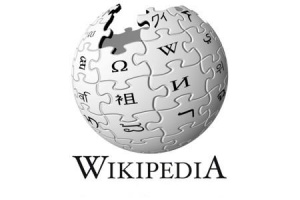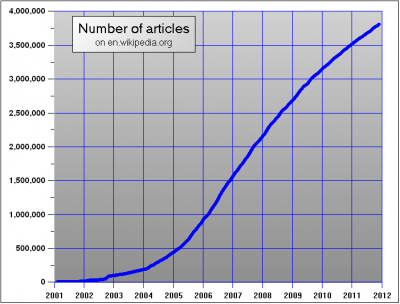Wikipedia
Wikipedia is a free, online encyclopedia whose entries are created, edited, and maintained by about 100,000 anonymous and semi-anonymous active users. It is collaboratively edited by volunteers around the world and is supported by the non-profit Wikimedia Foundation. The website has 23 million articles in 285 different languages. It has become the largest and most popular reference work on the Internet and has an estimated 365 million readers worldwide [1]. Wikipedia exists to provide a globally available, free, and encyclopedic resource for the world's population in their native language. It is created by the people for the people. The large presence of nonacademic content has led to various concerns, such as the quality of writing, the amount of vandalism, and the accuracy of information.
Contents
History
Wikipedia began as a subset of another free encyclopedia project, Nupedia, in early 2000. Nupedia was intended to be a free online English based encyclopedia whose articles were compiled and constructed by leading experts and formally reviewed before being included in the project. The name Wikipedia comes from the Hawaiian work wiki, meaning quick and encyclopedia[1].
Founders
Wikipedia was launched on January 15, 2001 by Jimmy Wales and Larry Sanger. As the project grew in size, Wales became the projects spokesperson and promoter. Larry Sanger began his wiki career as editor-in-chief of Nupedia, then became chief organizer of Wikipedia from 2001-2002. As one of Wikipedia's community leaders, he helped to establish some of the original policies of Wikipedia.
Technology
Wikipedia's software wiki was developed by Ward Cunningham. The website provides a format that allows for creation, editing and linking of pages by many different users. Wikipedia relies on opensource software for it to function. There are a variety of bots that operate within Wikipedia that are responsible for "patrolling" the online environment in order to carry out tasks such as correcting minor edits and spelling errors and identifying copyrighted material.
Editing
In anticipation of potential threats on credibility, Wikipedia utilizes two functions to maintain a neutral site and to patrol the site. The first is through collective knowledge of monitoring and contributing to a wide variety of articles. Wikipedia is open to editing which means that readers can edit the text without needing approval or a registered account. No article is considered to be owned by a creator or other editor therefore people must agree on the content and structure of articles by consensus. Certain features available in the Wikipedia software such as the "History" help keep track of revisions on each article and editors can use these pages to undo changes and restore lost content. All articles are equipped with a page for discussion. Consensus of editors is important to the Wikipedia process and is how articles remain unbiased with accurate, up to date information. When there are disputes over information in an article, rather than people editing and reediting every few minutes, issues are discussed on the talk pages.[2] This allows editors to collaborate and try to persuade the other sides of the arguments to agree with their position. If consensus cannot be reached through discussion, there are different options that Wikipedia takes. First, they will bring in a third opinion to sort out the argument. If that doesn't work, there may be administrative intervention. Those editors may be blocked from editing a certain page and administrators decide what edits are allowed under Wikipedia policy.
The second way to combat undesirable content is through computer bots that monitor the site for negative contributions to articles. These bots patrol the site and identify random inserts and unreliable information. They will also restrict certain IP addresses from contributing after a history of destructive contributions. On controversial articles, new users are not allowed to edit until they have used the site for an extended period of time and have proved themselves to be an unbiased editor[1].
Ethical Dilemmas
Unwanted Content
The legitimacy of Wikipedia articles has been called into question since the website's existence. There has been concern that the anonymous identity of Wikipedia's contributors has allowed misinformation to be printed through undesirable edits, poor quality of writing, and malicious intent. Under a pseudonym, editors are deindividualized and less likely to follow the unbiased writing style of Wikipedia.
Zittrain's discourse on Lessons of Wikipedia serves to acknowledge the individual and communal ethical conflicts Wikipedia struggles with. While the concern for users under anonymity abusing their position by editing articles maliciously is justified, Zittrain offers several reasons why over the long-term haul, users will act in a way that benefits the overall good of Wikipedia. The overall ideology of Zittrain's thoughts are characterized well in this short passage:"While the certainty of authority-sourced reward and punishment is lessened, we might predict two opposing results. The first is chaos: remove security guards and stores will be looted. The second is basic order maintained, as people choose to respect particular limits in the absence of enforcement. Such acting to reinforce a social fabric may still be due to a form of self-interest - game and norm theorists offer reasons why people help one another in terms that draw on longer-term mutual self-interest - but it may also be because people have genuinely decided to treat others' interests as their own...Thus, without the traffic sign equivalent of pages of rules and regulations, students who apprentice to generalized codes of honor may be prone to higher levels of honesty in academic work - and benefit from a greater sense of camaraderie. More generally, order may remain when people see themselves as a part of a social system - a group of people - more than utter strangers but less than friends - with some overlap in outlook and goals." [3]pg. 128
A sense of order and peace is maintained when people invest themselves and their time into a social system or in this case, a wealth of knowledge consolidated into an organized entity named Wikipedia. A lack of regulation in cyberspace such as Wikipedia does not always necessarily translate into a lack of order. This is because the motivation for an individual to seek personal gains or enjoyment out of malicious editing is reduced when the community or group presence is strong enough to persuade individuals of the significance of maintaining and creating a system beneficial for the greater good. In terms of Wikipedia, the wealth of knowledge contained in articles is enough to convince its community of users to maintain its ethics, accuracy, and integrity. Since users are invested in a superordinate goal that trumps their individual goals, Wikipedia benefits from having a tight-knit community committed to Wikipedia's growth and excellence as an online presence.
Barriers to Entry
While the sense of a close community of knowledge seekers and providers is what drives Wikipedia and its high level of quality information, becoming a part of the project can be difficult for new editors. People who have been contributing to Wikipedia for a long time, known as senior editors, as well as Wikipedia's fact and grammar checking bots can create a relatively hostile contribution environment for people who do not have much experience with Wikipedia's markup language or editing practices. "In 2006, only about 6 percent of "quality" new editors had their contributions rejected—a.k.a. "reverted" in Wikipedia lingo. In 2010, the number of contributions by new editors were being reverted at a rate of 1-in-4 by senior editors and the site's own automated response systems." [4] The rate at which senior editors and Wiki bots take down edits made by new contributors greatly de-incentivizes people to add their knowledge to the site. Without new editors and fresh edits, Wikipedia could see a rapid decline in the quality and number of its articles. However, Wikipedia has already started taking steps to remediate this problem through new software and protocols that better facilitate interactions between new and senior editors and acts as a type of introductory training to contributing to Wikipedia.
Systemic Bias
Most of Wikipedia's editors are highly educated young men, which may lead to systemic bias due to the background of the editors. Based on a research done by the company, 9 out of 10 of its contributors are male and the average age was 26. A higher percentage of them hold PhDs than does the public. [5] This has led to a decrease in its number of editors.
Systemic bias on Wikipedia follows biases in culture, favoring certain nationalities, ethnicities or majority religions. It may also follow the biases of Internet culture, inclining to topics that young, male, English-speaking, educated, technologically aware individuals wealthy enough to spare time editing are interested in, such as pop culture, technology, and current events. [6]
See Also
External Links
References
- ↑ 1.0 1.1 1.2 http://en.wikipedia.org/wiki/Wikipedia
- ↑ Wikipedia:Wikipedia:Consensus
- ↑ Zittrain, Jonathan. The Future of the Internet And How to Stop It. New Haven: Yale University Press, 2008. Print.
- ↑ Sampson, Tim. "Nobody Wants to Edit Wikipedia Anymore." The Daily Dot. N.p., 04 Jan. 2013.
- ↑ Kevin Rawlinson (August 8, 2011). "Wikipedia seeks women to balance its 'geeky' editors". The Independent. Retrieved from https://www.independent.co.uk/life-style/gadgets-and-tech/news/wikipedia-seeks-women-to-balance-its-geeky-editors-2333605.html
- ↑ Quilter, Laura (October 24, 2012). "Systemic Bias in Wikipedia: What It Looks Like, and How to Deal with It". University of Massachusetts – Amherst. Retrieved from http://works.bepress.com/cgi/viewcontent.cgi?article=1035&context=laura_quilter


